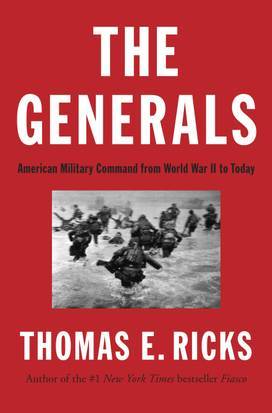
The Generals: American Military Command From World War II to Today
By Thomas E. Ricks
(Penguin Press)
Post-Vietnam U.S. military forces have acquired an unrivaled reputation for their ability to swiftly kick enemy butt. The shock and awe factor in the opening days of the past four major U.S. war deployments ― Panama, Kuwait, Afghanistan and Iraq ― sent an unmistakable message to would-be enemies around the world: Don’t mess with us.
But a common thread runs through these deployments and their less-than-stellar predecessors, the Vietnam and Korean wars: American commanders still haven’t figured out what to do after the initial butt-kicking is done and the longer-term occupation of a foreign land begins. After all this time and experience, we still don’t know how to win a protracted counterinsurgency war or, better still, end a war definitively before it gets to the insurgency stage.
As Thomas E. Ricks writes in “The Generals,” the problem isn’t with our front-line troops. It’s top-level commanders who have failed repeatedly at their jobs ― and repeatedly escaped serious retribution for lapses that turned resounding success in the early days of an invasion into long-term quagmire.
The theme of Ricks’ book is “relief,” the military word for firing a commander who loses the confidence of his superiors. Ricks argues that World War II was the last time relief was used effectively to serve notice among America’s top-ranking military officers that it’s not all cocktail parties, perks and power at the top.
Along with the privileges of rank comes the expectation of unwavering, expert-level managerial performance. Ricks credits the senior general of World War II, George C. Marshall, as the last commander to effectively use battlefield relief to oust underperforming generals and inspire the best from his remaining subordinates.
This book will no doubt satisfy war-history buffs who want greater insight into what distinguishes great commanders from mediocre ones. Readers will be shocked by stories of incredible errors among some of America’s most highly regarded war heroes, including the Operation Desert Storm commander, Gen. Norman Schwarzkopf, and his successor in the Afghanistan and Iraq invasions, Gen. Tommy Franks.
Ricks faults them for grousing in memoirs about the inadequacies of their subordinates instead of having fired them at the time they were failing in their commands. Franks was great at launching the Afghan and Iraq wars, Ricks says, but lousy at devising a post-invasion strategy.
This history is meaty, thoroughly researched and supported by lots of interviews with generals who witnessed the military command at its best and worst. This is where Ricks shines, building on the narrative from his two previous, Iraq-oriented books, “Fiasco” and “The Gamble.”
Where Ricks falls short, however, is in his overemphasis on relief as a central theme. I would have been just as satisfied with a book whose theme was, simply: Look at how even big-time war heroes can screw up.
Ricks obsesses on relief to the point of devoting an entire epilogue to his recommendations on how to restore relief and instill accountability among senior commanders.
It’s as if Ricks couldn’t decide who his audience was supposed to be ― a roster of maybe 75 top-level Pentagon decision-makers, or general-interest readers who don’t set military policy and really don’t need Ricks’ opinion, expert or not, on how to modernize the command-level accountability structure.
The former can get what it needs in a policy paper. The latter wants Ricks to pick up where Stephen Ambrose left off, and just tell us what it’s really like in the trenches and command huts amid the fog of war.
(MCT)
-
Articles by Korea Herald



















